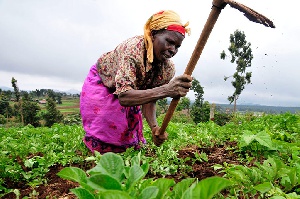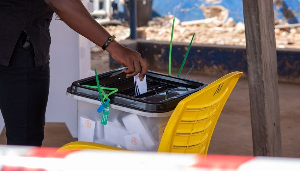The Deputy Minister of Food and Agricultural (crops) Dr. Ahmed Yakubu Alhassan has urged non-state actors in the agricultural value chain to complement government’s efforts at training farmers in modern agricultural methods of farming in so as to build their capacities and expand to other markets.
“African agriculture is making a transition from the usual farm to table agriculture to farm to market (both internal and external) agriculture; and that means that we cannot use the same old methods of production if we are to realise the benefits which come from expanding to other markets.
“Before local farmers can break into other markets, they will have to strengthen their agricultural value chains -- meaning there has to be quality products that enable them to compete with products coming from other markets; that is why non-state actors must come in to support the farmers to be able to do this,” he said in an interview with B&FT on the sidelines of the Ghana Non-State Actors sensitisation workshop held in Accra.
He reiterated government’s commitment to creating an enabling environment by providing the needed infrastructure in order to help facilitate trade from farms to the markets.
“Government’s role is to create the enabling environment for agribusinesses to thrive. The state can do this by investing in infrastructure—be it irrigation infrastructure, transport infrastructure or market places.
“Then non-state actors must invest in businesses that will make use of the infrastructure, else the benefits of creating such infrastructure cannot be realised. Government is playing its part by constantly investing in infrastructure to promote agriculture,” he said.
Kop’ep Dabugat, Coordinator for the CAADP Non-state Actors Coalition (CNC), said the organisation exists to bridge the gap created between non-state actors and government, and the non-state actors themselves.
“In 2010 it was realised in the CAADP partnership meeting that non-state actors’ engagement is very low, and because of this it affected the progress of implementing the CAADP target. So the process was set up to bring non-state actors together to see to their constructive engagement in the process of CAADP implementation. So this workshop is to sensitise non-state actors and let them know their role, bringing them together to brainstorm on how to push the agricultural sector.
“Non-state actors have been doing things separately without pooling together their strengths and energies; but now with the CAADP Non-state actors Coalition, they have a platform and they can now organise to plan and act together,” he said.
The Comprehensive Africa Agricultural Development Programme (CAADP) was developed as a response to Africa’s critical need for positive and sustainable growth in the agricultural sector. CAADP aims to achieve an agriculture-led socio-economic growth that will create wealth, tackle poverty and reduce hunger -- which requires broad and inclusive coalitions committed to acting in concert to improve the sector’s policies, programming and institutions.
The CAADP initiative has a target of increasing agricultural growth rates to six percent per year to create the wealth needed for rural communities and households in Africa to prosper.
The CAADP initiative rests on four main pillars, namely: extending the area under sustainable land management and reliable water control systems; improving rural infrastructure and trade-related capacities for market access; increasing food supply, reducing hunger, and improving response to food emergency crises; and improving agricultural research, technology dissemination and adoption.
Click to view details



Business News of Monday, 11 April 2016
Source: B&FT

















